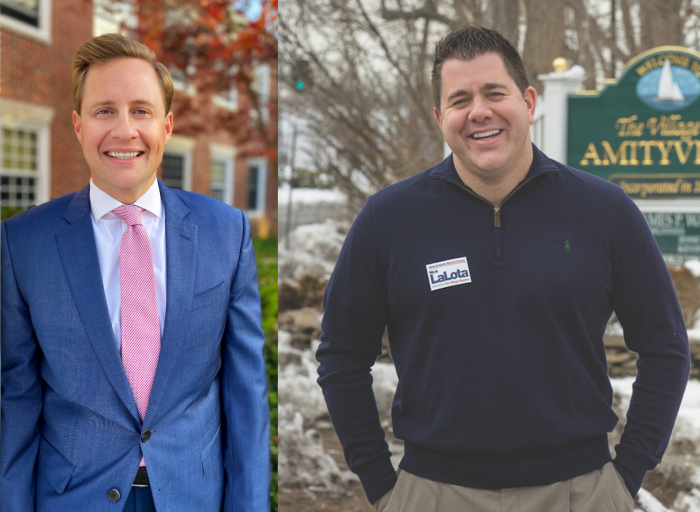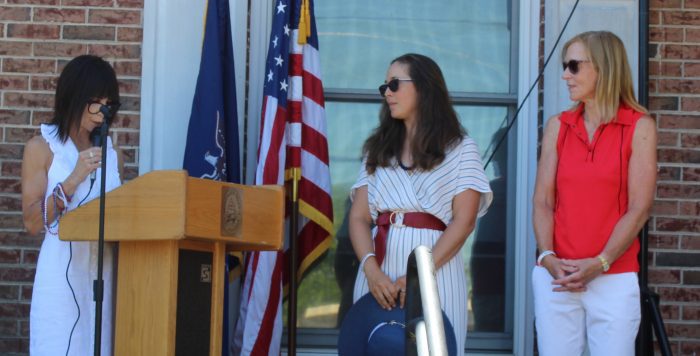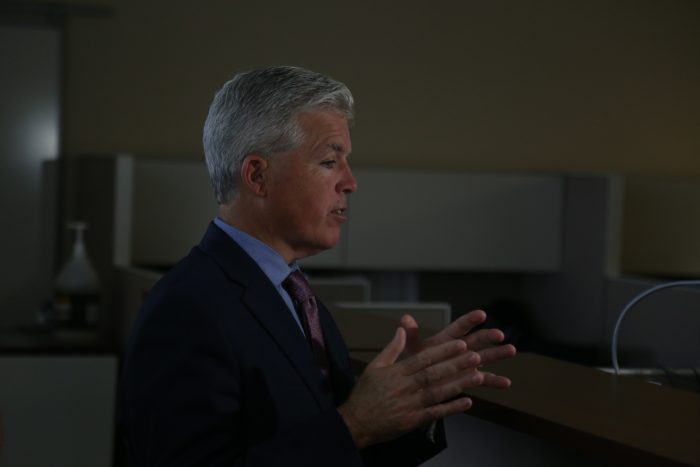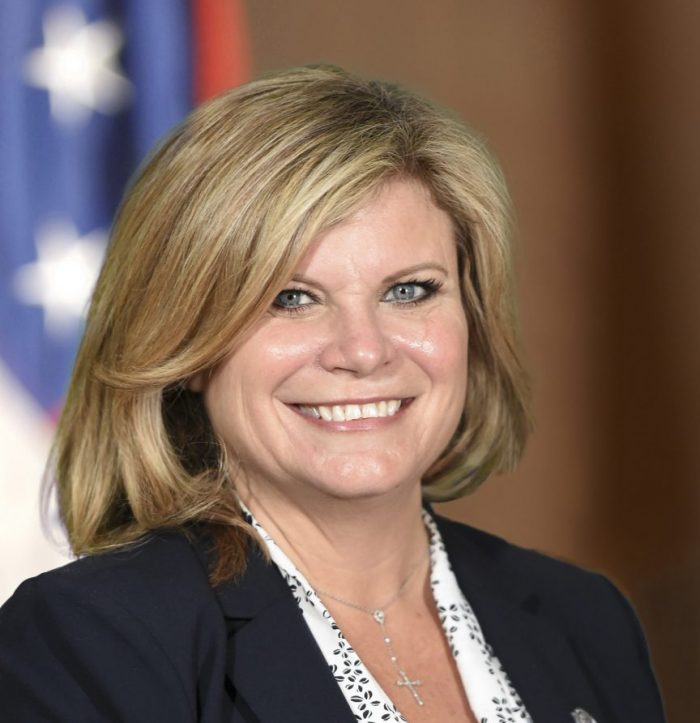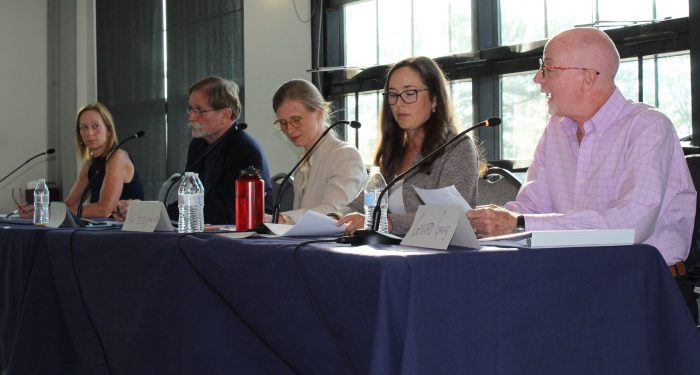Two candidates took to the virtual debate stage on Monday, Aug. 8, as the Republican primary contest for New York’s 1st Congressional District ramps up to succeed Rep. Lee Zeldin (R-NY1), who is a state gubernatorial candidate.
Hosted by the League of Women Voters of the Hamptons, Shelter Island, and the North Fork, declared Republican congressional candidates Anthony Figliola, of East Setauket, and Nick LaLota, of Amityville, squared off for the second time. The debate moderator was Estelle Gellman, who asked questions that were submitted in advance by the public. The third candidate in the race, Michelle Bond, declined the invitation to participate, according to Gellman.
The winner of the Republican primary race will likely face Suffolk County Legislator Bridget Fleming (D-Noyac), the presumptive Democratic nominee, in the general election this November.
Introductions
Figliola was born and raised in Rocky Point and currently resides in East Setauket. After serving as deputy supervisor of the Town of Brookhaven, he is executive vice president of a government relations and economic development business, according to his website. He said he entered the race due to a sense of frustration with Washington, which he believes has neglected ordinary citizens.
“People are hurting tremendously,” he said. “What’s happening is that Washington is not listening to them. I’m a regular working-class individual. Our family, we’re in the struggle with you. We understand what’s going on and I think we need someone who’s a regular, working-class person that’s going to fight for the people of this district.”
LaLota is the designated candidate for both the Republican and Conservative parties of Suffolk County. After graduating from the United States Naval Academy, he was deployed three times overseas and is a former Suffolk County Board of Elections commissioner. He said he is running to address the numerous complex issues facing the nation.
“There are important issues that we need to tackle as a nation,” he said. “Issues with respect to the economy, inflation, public safety, the border, protecting our constitutional freedoms — I’m eager to tackle those issues in Congress. There are good Republican and Conservative solutions to each one of those issues.”
Gun violence
After a proliferation of recent mass shootings around the country, the candidates were asked whether they would support additional restrictions on access to firearms, such as a ban on assault weapons or high capacity magazines.
As a gun owner, Figliola expressed his support for the Second Amendment and added that the majority of gun owners act safely.
“We have some very insane people that are committing these horrendous and heinous crimes,” he said. “I don’t believe we should be throwing the baby out with the bath water.”
Figliola said the issue of mass shootings is a matter of enforcement rather than additional restrictions. To curb mass violence, he believes that the laws on the books should be enforced and that illegal guns should be targeted and removed.
“The issue here is that we are not enforcing the laws,” he said. “When you go to places like Buffalo and that horrendous mass shooting — a shooting of 10 people — there were all these laws that the Democrats and Kathy Hochul, our governor, put in place and they said that that was supposed to stop mass shootings and it didn’t.” He also advocated for adding armed security in schools and for “a solution with mental health, but not going after law-abiding gun owners.”
LaLota said that the majority of gun crimes are committed with unregistered firearms. Like Figliola, he favored tougher enforcement of existing laws. Given his background, he suggests that he has a unique understanding and appreciation for responsible gun ownership.
“I’m a legal gun owner,” he said. “I grew up in a law enforcement family with a deep respect for the Second Amendment and for safely operating a firearm. I furthered that understanding as an officer in the military, where I learned to safely handle firearms.”
For LaLota, the problem of gun safety is closely tied to the issue of criminal justice reform. “In New York, we’re living in tough times with this bail reform law,” he said. “We have some folks out on the streets who should not be out on the streets.” He added, “It’s not a fact of not having enough laws. It’s a fact of not enforcing the laws that are on the books right now.”
Abortion
The recent Dobbs decision out of the U.S. Supreme Court, which overturned Roe v. Wade and Planned Parenthood v. Casey, has placed a cloud of uncertainty over the future of abortion access nationwide. When asked whether they would support legislation that would legalize abortion nationally, they each declined, opting instead to limit the existing abortion laws in the state.
“The recent Supreme Court decision, which gave the power back to the states and thereby the people, is good,” LaLota said. “This gives the maximum amount of power to we, the people, to hold the politicians accountable and have a policy that comports [with] their values.”
He referred to the existing abortion policies in New York as “radical,” suggesting that the state should modify its abortion laws to eliminate late-term abortions.
“We should celebrate life,” LaLota said, adding, “And the way that we celebrate life is by protecting it. I think that in New York, abortion should be on the ballot this November. We should ask every state assemblymember, every state senator and every candidate for governor: Would you support the repeal of the third trimester abortion provision?”
Figliola also supported the Dobbs decision. He argued that the decision-making power to regulate abortions should be in the hands of the people and their elected representatives rather than the Supreme Court.
“I believe that this current court got it right in giving it back to the states because the court should not be in a position to be legislating,” he said. “As a strict constitutionalist, it is the people who elect their representatives, petition their members of Congress and their state legislatures, and they choose what they want to vote on.”
Figliola favored drastic changes to existing abortion laws. “The reality is there shouldn’t be abortions at all,” he said. “On Long Island, between the ages of 18 and 24, we have a third of pregnancies that end in abortion. This is horrendous.” He added, “History is going to look back on us and they’re going to look very unkindly on us that we’re not choosing life — and not just the life of that child but the life of that mother and the hope and the amazing life that the two of them could live.”
Public health
The threat of COVID-19 remains a priority even two years after the height of the pandemic. Both candidates were asked whether they would favor mask mandates, quarantines or mandatory proof of vaccination for public events. In addition, they were asked to provide the steps that the federal government should take to promote the health of American citizens.
LaLota emphasized the importance of providing accurate information to the public while also empowering citizens to make their own health decisions.
“The federal government should allow people to have access to real, reliable information and people should be able to make decisions on their own,” he said. “I would be tremendously against any sort of federal law or federal mandate involving these sorts of health issues.”
Figliola condemned what he called “unconstitutional mandates,” which, according to him, have put people out of work. Regarding potential solutions, he suggests that the federal government begins to put together an endgame strategy for the postpandemic United States.
“I think that the pandemic, by and large, is over,” he said. “We’re now in the ‘endemic’ stages of things, and I think politicians want to find a way to control the people. They’re using the pandemic or whatever the next variant is to try to make people subservient.” He continued, “It’s people’s own individual rights to decide what they want to do with their body, with their children, with their health care — and we’re moving away from that.”
To watch the entire nearly one-hour debate, visit the SeaTv Southampton YouTube channel.

